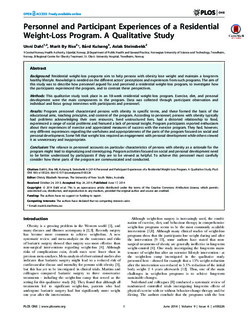| dc.contributor.author | Dahl, Unni Alice | |
| dc.contributor.author | Rise, Marit By | |
| dc.contributor.author | Kulseng, Bård Eirik | |
| dc.contributor.author | Steinsbekk, Aslak | |
| dc.date.accessioned | 2015-11-24T13:01:33Z | |
| dc.date.accessioned | 2015-12-04T09:48:20Z | |
| dc.date.available | 2015-11-24T13:01:33Z | |
| dc.date.available | 2015-12-04T09:48:20Z | |
| dc.date.issued | 2014 | |
| dc.identifier.citation | PLoS ONE 2014, 9(6) | nb_NO |
| dc.identifier.issn | 1932-6203 | |
| dc.identifier.uri | http://hdl.handle.net/11250/2366916 | |
| dc.description.abstract | Background:
Residential weight-loss programs aim to help persons with obesity lose weight and maintain a long-term healthy lifestyle. Knowledge is needed on the different actors’ perceptions and experiences from such programs. The aim of this study was to describe how personnel argued for and perceived a residential weight-loss program, to investigate how the participants experienced the program, and to contrast these perspectives.
Methods:
This qualitative study took place in an 18-week residential weight-loss program. Exercise, diet, and personal development were the main components in the program. Data was collected through participant observation and individual and focus group interviews with participants and personnel.
Results:
Program personnel characterized persons with obesity in specific terms, and these formed the basis of the educational aims, teaching principles, and content of the program. According to personnel, persons with obesity typically had problems acknowledging their own resources, lived unstructured lives, had a distorted relationship to food, experienced a range of social problems and featured a lack of personal insight. Program participants reported enthusiasm about their experiences of exercise and appreciated measures of success with the exercise program. They had, however, very different experiences regarding the usefulness and appropriateness of the parts of the program focused on social and personal development. Some felt that weight loss required an engagement with personal development while others viewed it as unnecessary and inappropriate.
Conclusion:
The reliance in personnel accounts on particular characteristics of persons with obesity as a rationale for the program might lead to stigmatizing and stereotyping. Program activities focused on social and personal development need to be better understood by participants if they are to be viewed as helpful. To achieve this personnel must carefully consider how these parts of the program are communicated and conducted. | nb_NO |
| dc.language.iso | eng | nb_NO |
| dc.publisher | Public Library of Science | nb_NO |
| dc.title | Personnel and participant experiences of a residential weight-loss program. A qualitative study | nb_NO |
| dc.type | Journal article | nb_NO |
| dc.type | Peer reviewed | en_GB |
| dc.date.updated | 2015-11-24T13:01:33Z | |
| dc.source.volume | 9 | nb_NO |
| dc.source.journal | PLoS ONE | nb_NO |
| dc.source.issue | 6 | nb_NO |
| dc.identifier.doi | 10.1371/journal.pone.0100226 | |
| dc.identifier.cristin | 1148842 | |
| dc.description.localcode | © 2014 Dahl et al. This is an open-access article distributed under the terms of the Creative Commons Attribution License, which permits unrestricted use, distribution, and reproduction in any medium, provided the original author and source are credited. | nb_NO |
